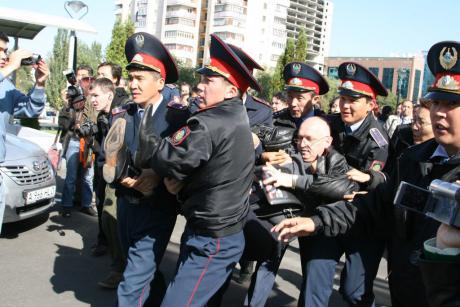One of the four, a local resident, died when one of the bombs went off prematurely. In a further serious development, on Saturday 12 November, a young man killed five law enforcement officers, two bystanders and himself in a shooting spree in Taraz, Southern Kazakhstan.
As rumours spread over Kazakhstan about shooting in Taraz on Saturday morning, authorities remained silent until the afternoon. Only at 18:00 the Public Prosecutor’s Office informed on the situation; reprimanding bloggers and internet users for contributing to panic by sharing unconfirmed information. The state channel Khabar had a story on the incident for the first time in its 20:00 news.
According to the Public Prosecutor, a “jihadist” stole rifles from a hunting shop where he killed two bystanders, returned home to pick up a grenade thrower, and continued shooting close to the Security Police (KNB) office in the centre of Taraz. He killed two KNB officers and two police officers before he blew up himself and the police officer who covered the shooter in order to reduce the damage.
At first, official news informed that it was an independent, lone terrorist. However, later investigators informed that they keep all options open and recently reported that the culprit was linked to the same terrorist group that was behind the blasts in Atyrau: Soldiers of the Khalifate.
Prior to the actions in Atyrau, the group had issued a You-Tube video where they threatened the government with action unless they repeal the new law on religion and again allow praying in government institutions.
Bombing attacks have been rare in Kazakhstan, but in May, two explosions including the country’s first known suicide bombing killed at least two people.
President Nazarbayev, expressing his condolences to the families of the victims guaranteed that “the state has all the possibilities, powers, professionalism, and abilities to suppress any manifestation of terrorism against Kazakhstan.” The President also called upon all Kazakhstanis to be vigilant and immediately report on all similar facts to the appropriate law enforcement agencies.
Religious believers that do not adhere to so-called traditional religions of Sunni Islam or Orthodox Christianity have been experiencing increasing pressure from the government and the society in Kazakhstan. – We strongly hope that similar violent actions do not reoccur, and urge any groups to refrain from such methods. However, we also urge authorities to develop policies to prevent such actions that do not limit fundamental freedoms. We are concerned such policies will only work against its purpose, concludes Engesland. Examples from other countries show that respecting freedoms is part of the solution, not part of the problem.
– Respecting fundamental freedoms is also part of the comprehensive security concept of the organisation that Kazakhstan led last year, the Organization on Security and Cooperation in Europe (OSCE). Fighting terrorism while respecting freedoms and human rights is at the core of what this organisation stands for.
